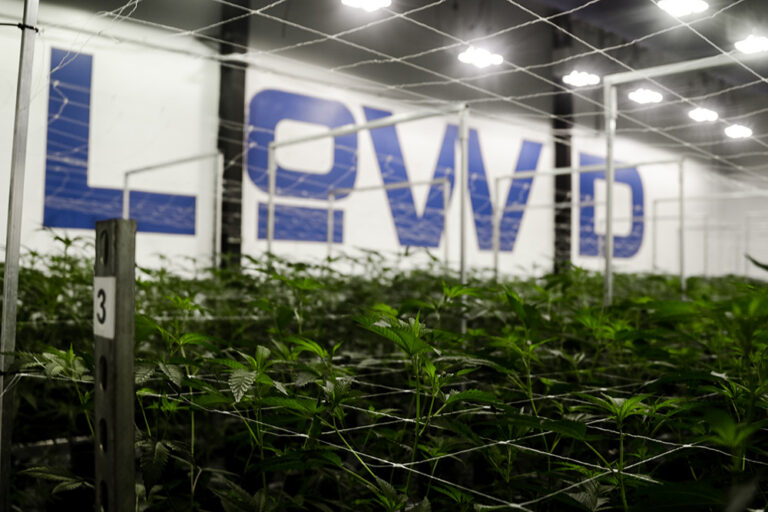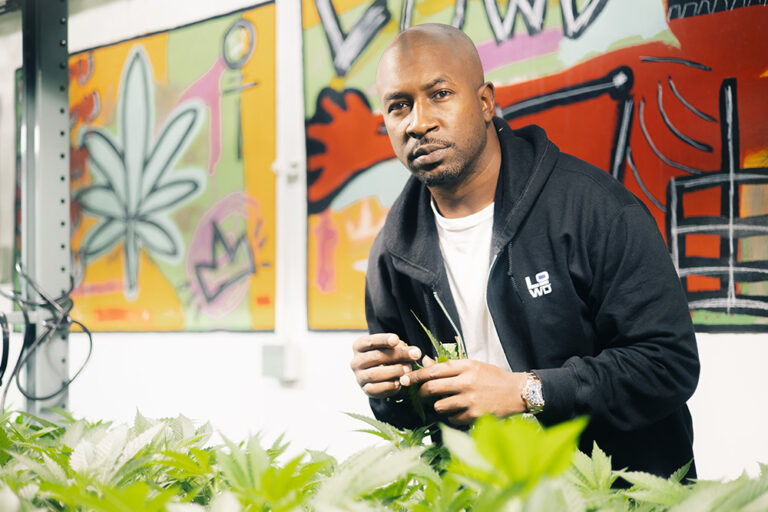LOWD Founder, Jesce Horton Doesn't Wait for Change; He Creates it
What does a master’s student at Cornell, the founder of two nonprofits, and the entrepreneur behind a profitable venture do in his spare time?
If it’s Jesce Horton, he smokes cannabis.
The brainy 40-year-old who heads LOWD cultivation company cuts an interesting figure in the cannabis space. Not only is he the rare cannabis executive who regularly partakes of his product, he both professionally and personally straddles the line between capitalism and social justice.
It’s not dramatic to say Horton represents everything voters were promised from legalization. He’s a smart, independent Black businessman who’s seen the back of a squad car. He founded a cannabis company in his basement and grew it into a multi-million-dollar business with his own hard work.
So, why is his story the exception instead of the rule?
All in the Timing
Horton’s success comes both from his own skills and a little luck. In late 2012, his company moved him to Portland, Oregon—just as the state legalized medical marijuana. Back then, the cannabis industry was welcoming to newcomers. It needed support from the populace, and the libertarian-minded state granted growers and users a great deal of discretion.
“It was an interesting time back then because if you had a medical card and you were growing plants for your own use, you could essentially take the left over and take it to any dispensary for them to sell,” Horton said. “There was no testing system or anything like that. So, I was able to benefit from that period in the industry.”
He enrolled in the medical program and started to grow a few plants in his basement. Soon, he was offloading large quantities of bud at local dispensaries. After a year of tinkering with lamps, swapping seeds, and devising new watering methods, Horton left his engineering job at Siemens to dedicate himself full-time to cannabis.
I think . . . fighting against prohibition enforcement and the ills that it’s caused to the community is always going to be a really important part of how I move in the cannabis industry.
Jesce Horton

Education Pays
To hear Horton tell it, anyone can grow weed. What separates the sprouts at LOWD from the run-of-the-mill cannabis is its attention to detail. Horton’s success relies on his combination of passion and talent. An engineering major at Florida State University and a long-time smoker, he possessed both the technical skills and the discerning palette to grow top-shelf herb.
“Any good cultivator will tell you that cultivation is really all about systems and processes, checks and balances. My background in industrial engineering played a great role in my ability to develop systems that were conducive to high-quality cannabis,” Horton said. “On top of that, I had an electrical background as well, so I was able to implement things in the basement grow that traditionally would have needed a more seasoned electrician to do. I was able to use some controls that I learned at Siemens to wire in some systems and efficiencies to help me monitor and control my equipment.”
When he decided to go big, he did what all entrepreneurs do: begged for money. After phoning 2,000 people from a list of “potential cannabis investors” and getting zero interest, he turned to people he knew personally. It took some work, but he finally convinced his father, who spent seven years in prison on a cannabis charge, to invest $30,000. After that, other friends and family were close behind.
Seeding Equity
What made Horton’s investors different from the typical moneyed interests was its pigmentation. Like Horton, his investors are Black. That matters. Legalization was meant to at least address—if not fix—the racially-tinged past of the War on Drugs. But, by nearly every estimate, the laws have failed.
The best data suggests less than 5 percent of cannabis executives are Black. Most of the industry’s profits are winding up in the pockets of those who were never negatively affected by restrictive cannabis laws.
“It’s interesting with cannabis legalization. They typically attach the [social] causes to the legislation, and that’s the reason that they want legalization. Then the dollars end up coming into play and they forget about those causes,” Horton said.
“I can go back to medical patients. That’s really where it came from. At first, it was all about patient access. Then, once recreational legalization comes in, the medical program is either gutted or completely eliminated,” he added. “Then they move onto wanting to get people out of jail. That was the next wave of reasons: there’s too many arrests, there’s too many people in jail. And then again, once the dollars start coming in, they start to re-implement prohibition enforcement policies like arrests and things like that to protect the businesses who want to make money. You’re seeing a reverse in what some of those initial causes they were pushing behind equity and legalization or legalization as a whole.”
But Horton is not content to be a pillar of what can go right in the space. He’s determined to turn the ideals of the law into reality.
It’s interesting with cannabis legalization. They typically attach the [social] causes to the legislation, and that’s the reason that they want legalization. Then the dollars end up coming into play and they forget about those causes.
Jesce Horton

A Bit of Hope
Toward those ends, he’s founded two nonprofit organizations focused on funding or growing companies operated by non-white executives—the Nuleaf Project and the Minority Cannabis Business Association. He also directs a third nonprofit called B3 (Ben’s Best Blnz) that was founded by Ben Cohen of Ben & Jerry’s Ice Cream fame. Eighty percent of B3’s profits get funneled back to Black cannabis entrepreneurs, while the remainder will be evenly divided between the Vermont Racial Justice Alliance and the Last Prisoner Project.
Slowly but surely, Horton’s work is forcing change.
“I think there’s a lot that can be done better without a doubt and I think that most people are right in causing and calling out those issues and that we are failing in many of those promises. However, there’s a lot of businesses that I meet and that I speak to on a weekly basis that are finding their way in the industry that are telling me that they have just gotten a license or that they found a location,” he said. “So, there is movement and there are amazing Black and Brown entrepreneurs that are finding their way in the industry, and they should be celebrated. But there’s a lot that we can do to improve that.”
That includes sticking with programs that push those affected by anti-cannabis laws to the front of the line for licenses, giving them time to grow, ending decades-old cannabis prohibitions, and making a concerted effort as consumers to back socially responsible businesses.
“I think that, because of my history with cannabis, my arrest and how it affected my life at the time and because of my dad’s history with cannabis and his time in prison, I think finding advocacy and community building and fighting against prohibition enforcement and the ills that it’s caused to the community is always going to be a really important part of how I move in the cannabis industry,” he said. “I’m a big consumer. I’m a connoisseur. I’m a grower. But equally, I’ve been affected in my life by some of the things that we’re seeing that are hurting the industry. So yes, it’s definitely a twofold thing for me.”
By Matt Weeks
Feature image photo credit: Sam Gehrke












